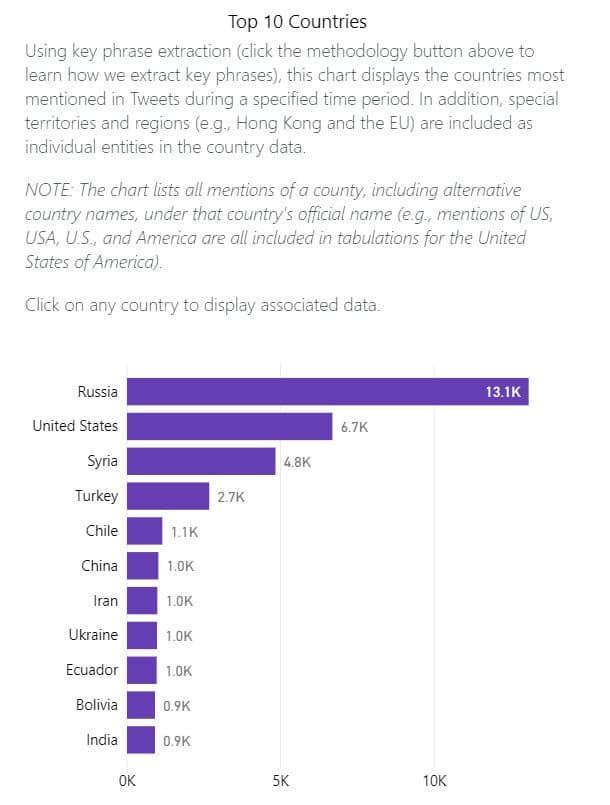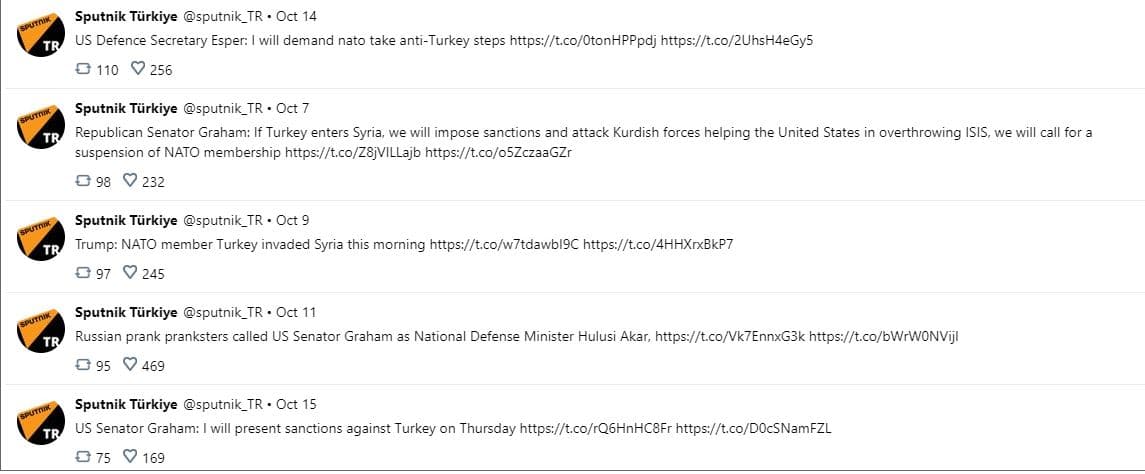Overview
On October 6, President Trump announced a U.S. withdrawal from northern Syria, leading to a week-long Turkish offensive against the Syrian Kurds. Since the announcement, Russian media and diplomats have doubled-down on their Syria coverage, hammering the United States for being an unreliable ally and, later, for “state banditry” in seizing Syrian oilfields. At the same time, Russian messengers celebrated the U.S. decision, framing it as the end of the United States’ “colonial occupation” in the Middle East and a clear victory for Vladimir Putin and the Russian Federation.
By the Numbers
Between October 6 and November 11, Russian diplomatic and media Twitter accounts monitored on Hamilton 2.0 mentioned Syria in over 4,800 tweets, placing it behind only Russia and the United States in terms of country mentions. During that time, monitored accounts used #Syria 997 times, a more than 300 percent increase over the month prior. It was the second most-used hashtag in aggregate (behind only #Russia), and the most-used hashtag by media accounts (674 uses).


Hamilton has also captured 67 video segments associated with Syria since the president’s withdrawal announcement, compared to just 52 segments associated with Russia (note: Hamilton does not capture every segment produced by RT; some segments were also associated with both countries). By comparison, between September 1 and October 5, Hamilton only captured four segments on Syria, signaling a huge uptick in broadcast coverage over the past month.
Similarly, there were more than 720 mentions of Syria in online articles that were published on Sputnik, RT, Tass, and Russia Beyond the Headlines between October 6 and November 11. This represents a more than 250 percent increase in coverage of Syria compared to September 1-October 5.
What We’re Seeing on Hamilton 2.0
Given the international attention on Syria after the U.S. drawback and the subsequent Turkish offensive, it is entirely unsurprising that Russian diplomatic and media mentions of Syria increased over the past month. One would certainly expect that most — if not all — countries’ saw a surge in coverage of the Syrian conflict. However, the preeminence of Syrian coverage, and the specific — at times competing — narratives the Russian Federation advanced were notable.
For instance, between October 7 and October 14, in the immediate aftermath of Trump’s announcement and at the height of the Turkish offensive, RT and other Russian state-funded media outlets framed President Trump’s decision as both cowardly, in terms of the U.S. abandonment of the Kurds, and courageous, in terms of Trump’s push back against “Washington hawks.” These dueling narratives played out throughout the week, with Sputnik declaring that “betraying the Kurds is the American way,” while RT was shifting blame to Trump’s political rival, Hillary Clinton, in a series of articles including one entitled “Crocodile Tears? Hillary Clinton tweets sickening horror in Syria is one man’s fault and gets reminded of her deeds.” Efforts to tweak sensitivities on both the left and the right of the American political spectrum is, of course, nothing new; Russia’s overt and covert influence operations have long courted disparate audiences.
Beyond playing up partisan divisions in the United States, Kremlin-backed messengers also reveled in the opportunity to needle the NATO alliance over the conflict between Turkey and the United States — two member states. Sputnik Turkey’s Twitter account mentioned NATO 156 times between October 6 and November 11, with the majority of those tweets highlighting fissures between Turkey and the rest of the alliance. The Sputnik Turkey Twitter account was also the second most-active account on Hamilton during that time, suggesting a concerted effort to target Turkish audiences with Kremlin-friendly narratives.

The unmistakable undercurrent throughout the past month, though, was that Russia was replacing “Atlantic hegemony” in the region. Variations on this theme were visible in most of the coverage, but an October 18 RT News segment perhaps summed it up best with this simple yet telling title, “Russia wins Syria.”
Why it Matters?
Shaping international public opinion around the Syrian conflict has long been a Russian messaging priority. Efforts to paint U.S. involvement as both illegitimate and ineffective has been a hallmark of overt and covert Russian information operations since at least 2015. It is therefore unsurprising that Russia’s diplomatic and media channels have seized upon the U.S. withdrawal to question the reliability of the United States, to expose cleavages within NATO, and to promote an image of Russia as the preeminent power in the Middle East.
The views expressed in GMF publications and commentary are the views of the author alone.





